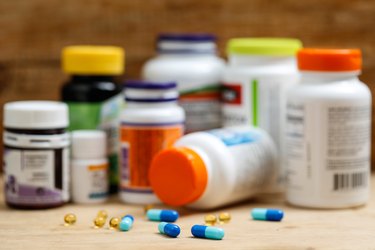
Out of the many fad diets out there, few are as universally discredited as the HCG Diet, a weight-loss plan that combines hormonal injections with a 500-calorie-per-day diet.
Here's what you need to know about the HCG Diet — including what it is and what the meals consist of — and more importantly, why you should stay far, far away from it.
Video of the Day
Video of the Day
What Is the HCG Diet?
The HCG Diet is a weight-loss plan that combines injections or supplements of human chorionic gonadotropin (HCG) — a hormone produced by the placenta during pregnancy to help nourish the fetus — with a 500-calorie-per-day diet.
Although the diet regained some popularity in the early 2010s — thanks in part to the publication of the book The Weight Loss Cure "They" Don't Want You to Know About and a spotlight on The Dr. Oz Show — the weight-loss plan actually dates back to the 1950s, when a British doctor named Albert T. Simeons reported that giving HCG injections to people with obesity helped curb their appetites; it also supposedly helped "move fat away" from certain places on the body, such as the hips and waist.
Writing in the journal The Lancet, Dr. Simeons claimed that a dose of 125 IU of HCG could help people with obesity limit their diets to 500 calories per day, which could help them lose weight.
Today, doctors usually use HCG to treat infertility in people assigned female at birth (AFAB), because the hormone helps release eggs from the ovaries, according to the Endocrine Society. HCG injections are only available via prescription. Unlike some drugs like phentermine, HCG is not approved by the Food & Drug Administration (FDA) for weight loss.
The Takeaway
The HCG Diet is a dangerous fad diet that pairs a very restrictive eating plan with daily HCG injections or supplements.
HCG Diet Phases and Foods

Proponents of the HCG protocol follow a strict, very-low-calorie diet that's usually limited to just a few types of foods. The plan is split into three phases, according to the HCG Diet's website.
Warning
The HCG Diet is dangerous and has not been shown to help people lose weight, so the details below are strictly for informational purposes.
Phase 1: Loading
This "gain-before-you-lose" stage takes place after you begin using HCG, but three to seven days before you start the calorie-restriction part of the diet. This phase aims to "build up your fat reserves" and includes only high-fat, high-calorie foods, such as:
- Chocolate
- Pastries
- Fried meats (especially pork)
- Eggs
- Bacon
- Mayonnaise
Phase 2: Low Calories
In the next stage, followers are advised to drop their daily food intake to 500 calories, usually spread over two meals (lunch and dinner). As for the menu, each meal should have one fruit, a slice of bread (some versions of the diet accept Melba toast as an alternative), 3.5 ounces (a little less than a half cup) of one vegetable and 100 grams (about 3.5 ounces) of meat, fish or eggs.
Snacks are technically not permitted on the plan, but some versions of the diet say it's OK to save a piece of fruit or slice of bread from one of your meals to eat later in the day.
Some HCG Diet-approved foods include:
- Meats: veal, beef, chicken breast
- Fish: fresh white fish, lobster, crab, shrimp
- Eggs: whole eggs, egg whites
- Vegetables: spinach, chard, chicory, beet greens, lettuce, tomatoes, celery, onions, cucumbers, asparagus, cabbage
- Fruits: grapefruit, apples, oranges, strawberries
- Tea and coffee in any amount without sugar (but some versions of the diet allow up to a tablespoon of milk)
Typically, people follow the low-calorie phase of the diet for 23 to 40 days.
Phase 3: Maintenance
The maintenance phase of the HCG Diet is meant to slowly build back up your calorie intake over four weeks:
- Week 1: Followers increase their food intake to between 700 to 900 calories per day, while sticking to the same foods they were eating in the low-calorie phase of the diet.
- Week 2: Daily calories increase to between 1,000 and 1,100, and the meal plan expands to include foods such as Greek yogurt or white cheeses.
- Week 3: The calorie goal bumps up to between 1,200 and 1,300, and followers can add in more foods, such as milk, salmon and mayonnaise.
- Week 4 (and beyond): Followers stick to eating 1,300 to 1,500 calories each day, which can include any type of food they like.
The Takeaway
The HCG diet lasts between 8 and 10 weeks and includes three phases, each with different rules around food and calorie counts.
HCG and Weight Loss
More than 40 years of research has shown that HCG does not help people with overweight or obesity lose weight. One study, published September 1976 in The American Journal of Clinical Nutrition (about 20 years after Dr. Simeons' paper in The Lancet), found that HCG didn't help a group of people AFAB lose any more weight on a 500-calorie-per-day diet than a placebo.
Since then, several other studies — including a March 2011 paper in the International Journal of Obesity — have been published showing that the diet isn't effective for weight loss. That was also the conclusion of a March 2016 review in the Journal of Dietary Supplements, which called it "completely unfounded."
According to the FDA, any weight loss that a person experiences on the HCG Diet isn't occurring as a result of HCG injections or supplements. Rather, they're losing weight because they're on an extremely restrictive diet — something that is "not only unhealthy but also dangerous."
In fact, eating too few calories — that's below 1,200 for people AFAB and under 1,500 for people assigned male at birth (AMAB) — can put your health in danger because it deprives you of the basic nutrients you need, according to Harvard Health Publishing.
It can also slow down your metabolism, making it harder to lose weight and putting you at risk for weight gain down the line, according to the Academy of Nutrition and Dietetics. People who lose weight quickly on low-calorie diets also tend to gain the weight back quickly, according to the U.S. National Library of Medicine.
What's more, the Endocrine Society points out that HCG has not been shown to move fat away from certain "problem areas" of the body or decrease hunger levels on a low-calorie diet.
"The general consensus from endocrinologists is: Don't do [the HCG Diet], because it doesn't work," says Bradley Anawalt, MD, an endocrinologist at UW Medicine.
The Takeaway
Research has shown that taking HCG does not help with weight loss, fat redistribution or appetite control.
Dosage and Intake Methods

HCG can be taken in two forms: by injection or as an oral supplement.
HCG Injections
HCG injections are only available via prescription from a doctor. HCG drugs like Pregnyl are FDA-approved to treat female infertility and a few other medical conditions, but they are not approved for weight loss (in either injection or supplement form).
Even the prescription drug label contains a disclaimer that HCG doesn't help people lose weight, redistribute body fat or decrease appetite, according to the FDA.
Taken by injection, the hormone can cause serious side effects (more on that below) in both people AMAB and AFAB.
HCG and B12 Injections for Weight Loss
Some people believe that combining HCG and vitamin B12 injections can ramp up weight loss, but there's no proof of this. As we've mentioned, HCG does not aid weight loss, and research hasn't found a link between B12 and weight loss either. Combining the two doesn't change these results.
HCG Supplements
Oral HCG supplements are usually sold as sublingual drops, pills, pellets and sprays; they can be found online or in certain weight-loss clinics or stores, according to the FDA. Popular examples include the Celeste Total HCG weight-loss kit and the Omni Drop program, which combines HCG and vitamin B12.
When taken by mouth, HCG is broken down by stomach acid and digestive enzymes, rendering the supplement inactive. Translation: The HCG "goes into your stomach and gets digested, so it does nothing at all," Dr. Anawalt says.
More specifically, HCG is what's called a peptide — "a bunch of amino acids that are stuck together, like a mini-protein," he says. "When you take [HCG] by mouth, it just gets digested like food."
If HCG is injected, he explains, it's not broken down by the body, and it lasts for hours or days, depending on the dose and where it's injected. In this case it's an active hormone, and it can act on the ovaries and testicles. You don't get the same effect with oral supplements.
Still, that's not to say HCG supplements are completely harmless. The FDA doesn't regulate supplements in the same way it does prescription drugs, so there's no guarantee that what's in the bottle matches the claim on the label. The supplement may contain too much — or, more likely in the case of HCG, none at all — of the ingredient you're looking for, and it may even contain other potentially harmful ingredients.
HCG Diet and Medications
As a general rule, the HCG Diet allows for medically necessary prescription medications, but it does not allow for over-the-counter meds (including diuretics, laxatives and appetite suppressants). Vitamin supplements may be continued as long as they are not in oil form.
The Takeaway
HCG can be taken orally or by injection, but oral HCG supplements do not have the same effect as hormone shots. There is no set HCG dosage for weight loss, because no amount of HCG is shown to help people lose weight.
HCG Diet and Exercise Concerns
Even proponents of the HCG Diet admit that you shouldn't try to exercise very hard during the low-calorie phase, because you won't have enough energy for it. If you aren't eating enough calories, exercising for long periods of time can cause dizziness, exhaustion and fatigue.
The recommendation, instead, is to do light exercise, such as yoga and walking.
And while you shouldn't exercise with the goal of losing weight, physical activity is part of a healthy lifestyle (with many benefits beyond the scale), and a diet that doesn't allow you to exercise isn't supportive of your overall health and wellbeing.
Some people also use HCG for muscle gain or bodybuilding purposes. People who misuse steroids also tend to inject HCG, because the hormone stimulates the production of testosterone, Dr. Anawalt says. (Testosterone plays a role in helping to build muscle, per Harvard Health Publishing.) But there are side effects from this, which we'll get into next.
The Takeaway
The HCG Diet limits the amount of exercise you're able to do, which doesn't support a healthy lifestyle.
Side Effects

Not only is the HCG Diet ineffective at helping people lose weight, but injecting HCG can also cause a number of short- and long-term side effects in both people AMAB and AFAB. (Taking HCG pills or other supplements by mouth has no effect, Dr. Anawalt says, because your digestive system breaks down the hormone before it can do anything in your body. In other words, these supplements are a complete waste of money.)
Warning
You should not take HCG if you are pregnant, as it could harm your baby and increase your risk for high blood pressure and related complications. You should also stay away from HCG if you're allergic to it or have certain hormone-related cancers, such as prostate cancer.
The risks of injected HCG include:
1. Multiples Pregnancies
HCG injections are used for fertility treatments in people AFAB. Done incorrectly, injecting HCG can cause the ovaries to release more than one egg at a time, which could lead to twins, triplets or quadruplets, Dr. Anawalt says.
2. Irregular Menstrual Cycles
HCG has the potential to cause irregular periods and vaginal bleeding, according to the Endocrine Society.
3. False-Positive Pregnancy Tests
HCG is found in pregnant people's urine, according to the Cleveland Clinic. At-home pregnancy tests look for this hormone to determine if someone is pregnant, which is why the HCG Diet could lead to false-positive pregnancy tests.
3. Blood Clots
Blood clots — which can then block blood vessels in the body, leading to serious health risks like pulmonary embolism — may be another possible side effect of the HCG Diet, according to the Mayo Clinic. One May 2013 Annals of Pharmacotherapy case study reported an instance of a 64-year-old person AFAB who developed leg deep vein thrombosis (DVT) two weeks after starting the HCG Diet.
4. Nausea
In people AFAB, HCG injections can cause nausea, Dr. Anawalt says. (Nausea and vomiting are possible side effects of hormonal fertility treatments, according to the Mayo Clinic.)
5. Thyroid Problems
HCG could lead to problems with the thyroid. In one January 2016 Case Reports in Endocrinology case study, a 60-year-old person AFAB who was injected with HCG for weight loss developed a painful mass on her thyroid. This ultimately led to hypothyroidism (when the thyroid doesn't release enough thyroid hormone), and the authors note that the HCG injections played a major role in the development of this condition.
6. Decreased Sperm Production and Infertility
For people AMAB, taking large doses of HCG results in high levels of testosterone. When that happens, says Dr. Anawalt, "you're basically in the category of steroid abuse." And the risks are similar, including a possible decrease in fertility.
That's because HCG stimulates testosterone production, and high levels of testosterone can turn off the body's production of luteinizing hormone (LH) and follicle-stimulating hormone (FSH), two hormones that are necessary for the production of sperm, he says.
7. Breast Enlargement and Tenderness
Not only does HCG increase testosterone levels, it also causes more testosterone to be converted to estrogen in the body, Dr. Anawalt says. Too much estrogen can cause breast growth (called gynecomastia) in people AMAB. Sometimes the breast tissue can feel tender when touched, per the Cleveland Clinic.
To block this conversion of testosterone to estrogen, people also take a medication called anastrozole — "a dangerous combination," Dr. Anawalt says. "When you block the conversion of testosterone to estrogen, you're blocking a small amount of estrogen that all men need to maintain their bones and keep body fat off," he says. Low estrogen levels causes your body to store more fat around the abdomen, he says.
8. Other Side Effects
According to the Mayo Clinic, additional effects of the HCG Diet (and very-low-calorie diets in general) could include:
- Fatigue
- Irritability or anxiety
- Restlessness
- Depression
- Gallstones (hardened deposits of digestive fluid that form in the gallbladder)
- Irregular heartbeat
- Electrolyte imbalance
The Takeaway
The HCG Diet can cause dangerous short- and long-term side effects from both taking HCG and eating such a low-calorie diet.
The Bottom Line
Doctors and experts from leading medical organizations such as the FDA and Endocrine Society emphasize that no one should try the HCG Diet to lose weight. Not only can injecting HCG be dangerous, but the very-low calorie diet plan (500 calories a day) carries plenty of health risks of its own.
If you're trying to lose weight, there are healthier eating plans to follow — ones that won't ask you to limit your calorie intake to near-starvation levels or jab yourself with needles.
A Safer Weight-Loss Alternative
Follow LIVESTRONG.com's Weight-Loss Kickstart program, a step-by-step guide to help you achieve healthy, long-term weight loss.
- Cleveland Clinic: "Pregnant Tests"
- Endocrine Society: "The Human Chorionic Gonadotropin (hCG) Diet"
- The Lancet: "The Action of Chorionic Gonadotrophin in The Obese"
- HCG Diet
- The American Journal of Clinical Nutrition: "Ineffectiveness of Human Chorionic Gonadotropin in Weight Reduction: a Double-blind Study"
- International Journal of Obesity: "An Unfortunate Resurgence of Human Chorionic Gonadotropin uUse for Weight Loss"
- Journal of Dietary Supplements: "Evidence for, and Associated Risks with, the Human Chorionic Gonadotropin Supplemented Diet"
- Food & Drug Administration: "Avoid Dangerous HCG Diet Products"
- U.S. National Library of Medicine: "Diet for Rapid Weight Loss"
- Harvard Health Publishing: "Testosterone — What It Does And Doesn't Do"
- Mayo Clinic: "Has the HCG Diet Been Shown to Be Safe and Effective?"
- Cleveland Clinic: "Enlarged Male Breast Tissue (Gynecomastia)"
- Academy of Nutrition and Dietetics: "4 Ways Low-Calorie Diets Can Sabotage Your Health"
- Harvard Health Publishing: "Calorie Counting Made Easy"
- Annals of Pharmacotherapy: "Effect of the human chorionic gonadotropin diet on patient outcomes"
- Case Reports in Endocrinology: "Thyroid Swelling and Thyroiditis in the Setting of Recent hCG Injections and Fine Needle Aspiration"